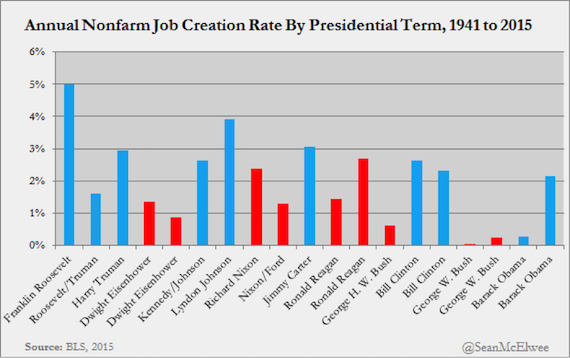Even knowledge-based jobs will disappear as wealth gets more concentrated at the top in the next 10 years.
May 7, 2015
Photo Credit: via YouTube
What will happen to American jobs, incomes, and wealth a decade from now?
Predictions
are hazardous but survivable. In 1991, in my book The Work of Nations, I
separated almost all work into three categories, and then predicted
what would happen to each of them.
ADVERTISEMENT
The
first category I called "routine production services," which entailed
the kind of repetitive tasks performed by the old foot soldiers of
American capitalism through most of the twentieth century -- done over
and over, on an assembly line or in an office.
I
estimated that such work then constituted about one-quarter of all jobs
in the United States, but would decline steadily as such jobs were
replaced by new labor-saving technologies and by workers in developing
nations eager to do them for far lower wages. I also assumed the pay of
remaining routine production workers in America would drop, for similar
reasons.
I was not far wrong.
The second
category I called "in-person services." This work had to be provided
personally because the "human touch" was essential to it. It included
retail sales workers, hotel and restaurant workers, nursing-home aides,
realtors, childcare workers, home health-care aides, flight attendants,
physical therapists, and security guards, among many others.
In
1990, by my estimate, such workers accounted for about 30 percent of
all jobs in America, and I predicted their numbers would grow because --
given that their services were delivered in person -- neither advancing
technologies nor foreign-based workers would be able to replace them.
I
also predicted their pay would drop. They would be competing with a
large number of former routine production workers, who could only find
jobs in the "in-person" sector. They would also be competing with
labor-saving machinery such as automated tellers, computerized cashiers,
automatic car washes, robotized vending machines, and self-service gas
pumps -- as well as "personal computers linked to television screens"
through which "tomorrow's consumers will be able to buy furniture,
appliances, and all sorts of electronic toys from their living rooms --
examining the merchandise from all angles, selecting whatever color,
size, special features, and price seem most appealing, and then
transmitting the order instantly to warehouses from which the selections
will be shipped directly to their homes. So, too, with financial
transactions, airline and hotel reservations, rental car agreements, and
similar contracts, which will be executed between consumers in their
homes and computer banks somewhere else on the globe."
Here
again, my predictions were not far off. But I didn't foresee how
quickly advanced technologies would begin to make inroads even on
in-person services. Ten years from now I expect Amazon will have wiped
out many of today's retail jobs, and Google's self-driving car will
eliminate many bus drivers, truck drivers, sanitation workers, and even
Uber drivers.
The third job category I named
"symbolic-analytic services." Here I included all the problem-solving,
problem-identifying, and strategic thinking that go into the
manipulation of symbols—data, words, oral and visual representations.
I
estimated in 1990 that symbolic analysts accounted for 20 percent of
all American jobs, and expected their share to continue to grow, as
would their incomes, because the demand for people to do these jobs
would continue to outrun the supply of people capable of doing them.
This widening disconnect between symbolic-analytic jobs and the other
two major categories of work would, I predicted, be the major force
driving widening inequality.
Again, I wasn't far off. But
I didn't anticipate how quickly or how wide the divide would become, or
how great a toll inequality and economic insecurity would take. I would
never have expected, for example, that the life expectancy of an
American white woman without a high school degree would decrease by five
years between 1990 and 2008.
We are now faced not just
with labor-replacing technologies but with knowledge-replacing
technologies. The combination of advanced sensors, voice recognition,
artificial intelligence, big data, text-mining, and pattern-recognition
algorithms, is generating smart robots capable of quickly learning human
actions, and even learning from one another. A revolution in life
sciences is also underway, allowing drugs to be tailored to a patient's
particular condition and genome.
If
the current trend continues, many more symbolic analysts will be
replaced in coming years. The two largest professionally intensive
sectors of the United States -- health care and education -- will be
particularly affected because of increasing pressures to hold down costs
and, at the same time, the increasing accessibility of expert machines.
We
are on the verge of a wave of mobile health applications, for example,
measuring everything from calories to blood pressure, along with
software programs capable of performing the same functions as costly
medical devices and diagnostic software that can tell you what it all
means and what to do about it.
Schools and universities
will likewise be reorganized around smart machines (although faculties
will scream all the way). Many teachers and university professors are
already on the way to being replaced by software -- so-called "MOOCs"
(Massive Open Online Courses) and interactive online textbooks -- along
with adjuncts that guide student learning.
As a result,
income and wealth will become even more concentrated than they are
today. Those who create or invest in blockbuster ideas will earn
unprecedented sums and returns. The corollary is they will have enormous
political power. But most people will not share in the monetary gains,
and their political power will disappear. The middle class's share of
the total economic pie will continue to shrink, while the share going to
the very top will continue to grow.
But the current
trend is not preordained to last, and only the most rigid technological
determinist would assume this to be our inevitable fate. We can --
indeed, I believe we must -- ignite a political movement to reorganize
the economy for the benefit of the many, rather than for the lavish
lifestyles of a precious few and their heirs. (I have more to say on
this in my upcoming book, Saving Capitalism: For the Many, Not the Few,
out at the end of September.)
Robert B. Reich has served
in three national administrations, most recently as secretary of labor
under President Bill Clinton. He also served on President Obama's
transition advisory board. His latest book is "Aftershock: The Next
Economy and America's Future." His homepage is
www.robertreich.org.






